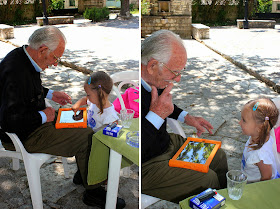The second chapter of Amalia’s Greek odyssey, after Mykonos,
was a visit to the Greek village of Lia on the Albanian border, where her
grandfather, Nicholas Gage, was born. As
he wrote in the book “Eleni”, the village
was occupied by Communist guerrillas during the Greek civil war, and in June of
1948, when the guerrillas prepared to collect the children and
send them behind the Iron Curtain to re-education camps, Nick’s mother, Eleni
Gatzoyiannis, organized the escape of her 8-year-old son and three of his four
sisters, in the hope that they could eventually join their father in Worcester, MA.
After the escape, Eleni Gatzoyiannis was arrested,
imprisoned in the basement of her own house along with 30 other prisoners,
tortured and eventually executed by a firing squad. Many prisoners were buried in the yard of the
house, which the guerrillas had taken over for their headquarters. After the
war ended and the Communists were driven back over the border, the empty house
fell into ruin. In 2002 Eleni Gage,
Nick’s daughter, spent a year in the village rebuilding her grandmother’s
house, a saga she recorded in her travel memoir “North of Ithaka.”
The photos above show three generations: Nick, daughter
Eleni Gage Baltodano, and granddaughter
Amalia Baltodano, posing on the terrace of the Eleni Gatzoyiannis house, which
has been decorated and furnished just as it was during Amalia’s great
grandmother’s lifetime, including traditional clothes of the period.
The plaque over the door lists three dates: 1856 when the
original two-room house was built by an ancestor of Nick’s father, Christos
Gatzoyiannis, (a coin with that date was buried under the cornerstone), 1924, when
Christos expanded the house by adding on a large room and hallway, and 2002,
when Eleni Gage rebuilt her grandmother’s house with the help of Albanian
workers, using the same stones that had fallen into the foundation.
Inside the house, over one fireplace, is a photograph of
Nick’s mother and father, when they were first married in 1926. In this main room there are also an iron bed,
a wooden cradle and a carved and painted casella
(dowry chest).
A guest book records the names and comments
of people who have come from all over the world to see the place where Eleni
lived and died.
On a low table called a soufra,
Amalia found a giant spoon,
Which she discovered would also work as a hat.
After visiting the house, everyone went to see who was
sitting in the square outside Lia’s Inn, where last summer Amalia had so much
fun sailing flowers in the spring.
last summer
She practiced walking on the ledge around the plane tree.
And she showed Vangeli, one of the elders of the village,
how to play “Endless Alphabet” on her I-Pad.
Vangeli likes to call himself the “psychiatrist of the
sidewalk” because he’s usually sitting in the square watching the world go by,
but he was not experienced in the use of the I-pad that Amalia was carrying.
He caught on fast to “Endless Alphabet.”
Dinner at the house of next-door neighbors Dina and Andreas
Petsis is always the highlight of a visit to the village, because Dina is a
world-class cook, incorporating into her dishes wild greens including nettles,
seasonal treats from her garden like stuffed squash blossoms, and her own
chickens and eggs.
This is just part of Dina and Andreas’s collection of
antique hammered copper and brass, the traditional craft of this area of Epiros.
Amalia used some of it to make a tea party for herself and
their little dog Rudy.
When it was time to leave the village and move on to Corfu,
Amalia stopped by the courtyard of the Inn to tell everyone good-bye and to promise
that she’d be back next summer.


















Joan, thank you so much for sharing Eleni's grandmother's ("the family") home in full color. It is beautiful. Your granddaughter Amalia is exquisite and so precocious, she will make a perfect hostess someday.
ReplyDeleteI love your blog!
Tara Stuart, San Diego, CA
Great photos. Loved the books. It's nice to see the family story continue with the little one.
ReplyDelete